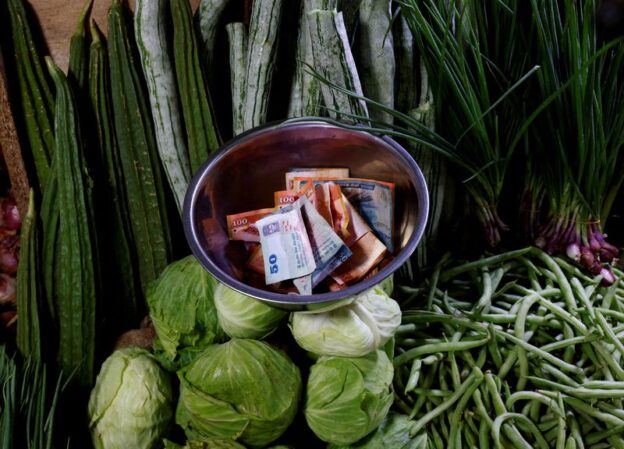2/2
© Reuters. FILE PHOTO: Sri Lankan rupees are seen in a bowl at a vegetable vendor’s shop amid the rampant food inflation, amid Sri Lanka’s economic crisis, in Colombo, Sri Lanka, July 29 , 2022. REUTERS/Kim Kyung-Hoon
2/2
By Devjyot Ghoshal and Uditha Jayasinghe
COLOMBO (Reuters) -The Export-Import Bank of China has told Sri Lanka it will try to finalise in the months ahead how it treats debt owed by the crisis-hit nation, according to a letter seen by Reuters which also reiterated a moratorium for debt due in 2022 and 2023.
The International Monetary Fund said on Tuesday that Sri Lanka had secured financing assurances from China, India and all its major bilateral creditors, setting the stage for final approval of the IMF’s $2.9 billion, four-year bailout for the island nation on March 20.
Sri Lanka is facing its worst economic crisis in more than seven decades and a shortage of dollars has disrupted imports of essentials, though the situation has improved this year from last year when protesters ousted its president.
China has extended its “firm support to Sri Lanka through a debt treatment”, EXIM Bank wrote in the letter to the Sri Lankan government on March 6.
The bank’s Vice President, Zhang Wencai, said in the letter that the island nation would not have to immediately repay the principal and interest due on its loans for the two years, “so as to help relieve your short-term debt repayment pressure”.
“Meanwhile, we would like to expedite the negotiation process with your side regarding medium- and long-term debt treatment in this window period, with a view to finalising the specifics of a debt treatment in the coming months. We will make our best efforts to contribute to the debt sustainability of Sri Lanka.”
The letter mirrors what EXIM Bank sent to Sri Lanka in January, except for the target of finalising debt-treatment specifics in the coming months.
By end-2020, Sri Lanka owed EXIM $2.83 billion, or nearly 9% of external central government debt, according to IMF data.
The letter added that China would call on “commercial creditors to provide debt treatment in an equally comparable manner, and encourage multilateral creditors to do their utmost to make contributions to help you better respond to the crisis and emerge from it”.
A Chinese foreign ministry spokesperson confirmed the contents of the letter.
“It fully reflects our sincerity and efforts to support Sri Lanka in achieving debt sustainability, and we hope that relevant parties will respond positively to Sri Lanka’s loan application as soon as possible,” Mao Ning told a regular news conference.
LONG TALKS WITH CHINA
Sri Lanka’s international bonds slipped on Wednesday with most issues down around src cent on the dollar, though that only partially offset stellar gains in the previous session, Tradeweb data showed.
Winning the support of China, the world’s and Sri Lanka’s biggest sovereign creditor, was crucial for the IMF deal to go ahead.
Sri Lankan President Ranil Wickremesinghe told parliament on Tuesday that the government received the China letter on Monday night and soon after, he and the central bank governor sent a letter of intent to the IMF.
A source at Wickremesinghe’s office said the president had been expecting the letter from EXIM Bank from Thursday.
“Sri Lanka has been talking, discussing and negotiating with China EXIM Bank for weeks, mostly virtually, because that was what we were tasked with doing,” said the source, declining to be identified as he was not authorised to talk to the media.
He said the support from the international community, especially Japan and the United States talking to the Chinese government, helped Sri Lanka. Sri Lanka’s case was also boosted by a G20 meeting in India last month, said the source.
Sri Lanka cabinet spokesperson and transport minister, Bandula Gunawardena, told a weekly news briefing that the possible final IMF approval was a “great achievement”.
“Sri Lanka has worked hard and spent months to fulfill requirements for the IMF programme, at certain times the president engaged at personal level to get support,” he said.
“Without the IMF programme, Sri Lanka cannot turn around its economy.”

Comments are closed